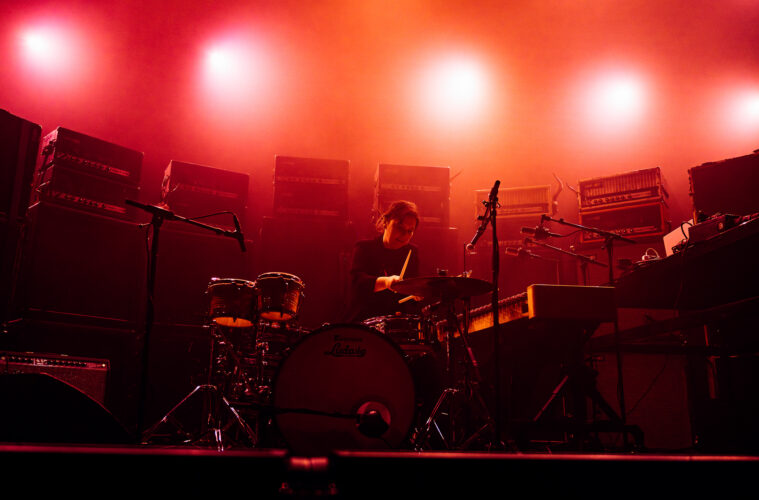Valentina Magaletti, protagonista assoluta dell’ ultima edizione di Le Guess Who, ci ha regalato una conversazione su identità, inclusività e molto di più in occasione della convention olandese.
Together in sound non è stato solo lo slogan del Le Guess Who? 2025: è stato la cifra di un’edizione che ha trasformato Utrecht in una mappa sonora globale, dove le latitudini musicali si incrociano senza gerarchie né centri privilegiati. Un festival che da anni si distingue per coraggio curatoriale e vocazione internazionale, ma che quest’anno ha spinto ancor più a fondo sull’idea di non-eurocentricità, diventando un viaggio vertiginoso tra free jazz, tradizioni indigene, sperimentazione elettronica e nuove avanguardie diasporiche.
Tra le protagoniste assolute di questa edizione c’è Valentina Magaletti: percussionista italiana con base a Londra, figura cardine dell’avant-rock contemporaneo, sperimentatrice instancabile e, quest’anno, anche co-curatrice del festival. La sua presenza ha assunto la forma di un vero e proprio percorso dentro il suo universo di collaborazioni: quattro live con formazioni diverse (UpSammy, Zongamin, Phew, Moin) e una selezione curatoriale che riflette una visione musicale e politica precisa.
L’abbiamo incontrata a Utrecht, poche ore dopo il suo primo live sold out, per parlare di identità, improvvisazione, inclusività, comunità queer, musei, progetti futuri e Londra — città che considera la più musicale del mondo.
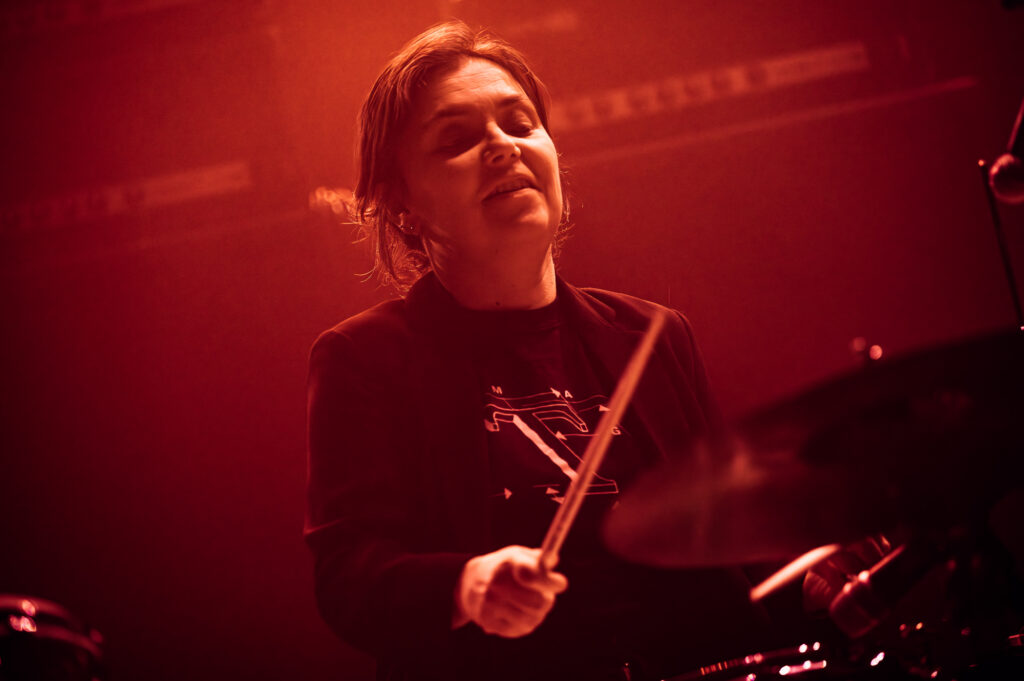
Valentina, benvenuta su Parkett. Partiamo da qui: cosa rappresenta per te il Le Guess Who rispetto al panorama dei festival?
Per me è un festival fondamentale perché mette in pratica ciò che molti altri dichiarano soltanto. Inclusività, cura, non-eurocentricità: qui non restano concetti astratti, si traducono in scelte reali, nella line-up, nelle modalità di produzione, nell’ascolto verso le comunità artistiche. L’edizione di quest’anno è stata un giro del mondo: dal Perù al Giappone, dalla cumbia alla musica indigena. È come dovrebbe essere l’arte in generale, non solo la musica.
Questi criteri hanno influenzato anche le tue scelte come co-direttrice artistica?
Totalmente. Con Jacob (Hageelars, responsabile della programmazione, ndr) abbiamo ribadito fin dall’inizio che la mia selezione sarebbe stata non-eurocentrica. Credo che l’85% degli artisti che ho invitato quest’anno siano donne, queer, trans o non-binary. È stato naturale per me: non è un gesto programmatico, è semplicemente la realtà della scena contemporanea che frequento e che considero vitale.
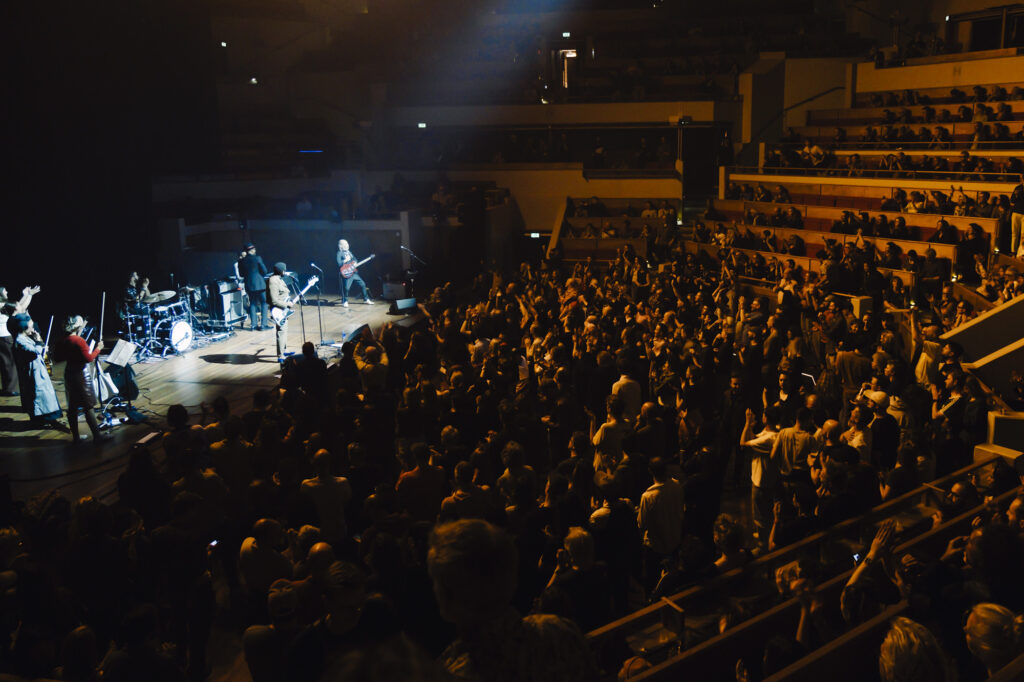
Ieri hai debuttato sul palco con la prima delle tue performance. Come è andata?
Molto bene. Era presto e la sala era completamente pieno. Duemila persone. Il set con UpSammy ha questa dinamica di tensione e rilascio, flirta con la sensazione di non essere a proprio agio, non è pop e neanche elettronica “facile”: è un progetto molto di nicchia. Eppure c’è stato un dialogo energetico fortissimo. Mi ha colpito.
Il set era costruito a partire da brani di un nuovo lavoro in uscita?
Sì, abbiamo suonato materiali che usciranno per Pan a marzo.
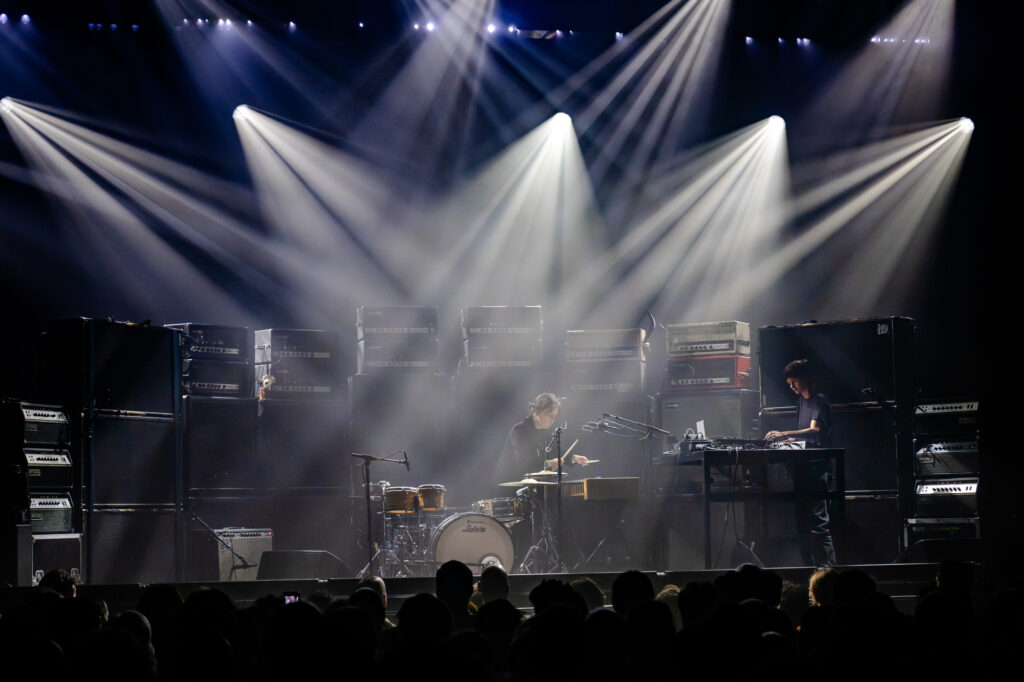
Il tuo progetto con UpSammy è nato in un contesto museale?
Sì, ci siamo incontrate per una commissione del Rijksmuseum. Abbiamo studiato i riverberi delle stanze del museo, registrato con microfoni incredibili, portato marimba e percussioni ovunque. Da quella residenza è nato naturalmente il desiderio di fare un disco. Poi il mio booking agent ha proposto di portarlo dal museo ai live, ed eccoci qui.
Mantieni un forte legame con la dimensione visiva, penso ad esempio al progetto Batterie Fragili.
Assolutamente. Il mio lavoro con Yves Chaudet è uno studio sulla fragilità, sull’attrito, sui materiali. Per me non è un “side project”: è parte integrante del mio percorso. Passo più tempo a scegliere una copertina che un mastering engineer. Però non ho ancora trovato il mio visual artist “anima gemella”: non cerco visual scenografici, cerco qualcuno che aggiunga senso.
Stasera ti esibirai con Zongamin, domenica con Moin, e poi la performance con Phew — una delle leggende più radicali della scena giapponese.
Phew per me è un national treasure. Quando mi hanno detto che avevo carta bianca per invitare chi volevo, ho provato subito con DJ Sprinkles e con Phew. E siamo riusciti a portarla da Tokyo: per me è come un sogno che si avvera.
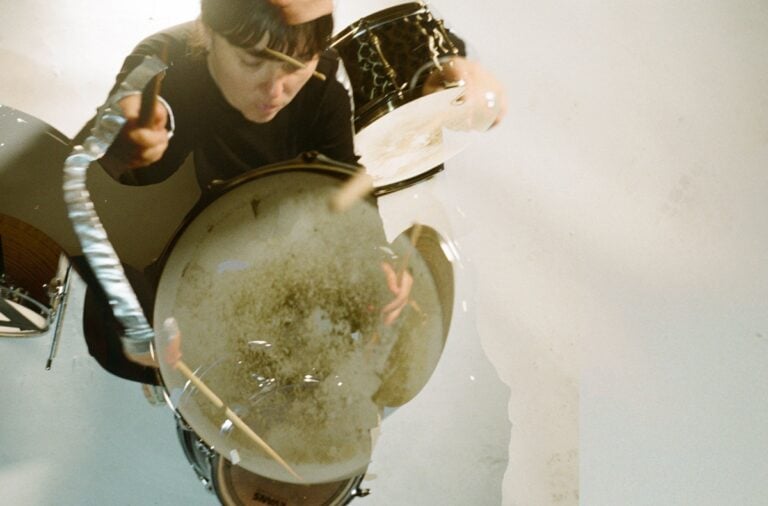
Il vostro set sarà completamente improvvisato?
Sì. Ci siamo scritte via mail e abbiamo deciso una cosa semplice: ascoltarci. Tutto dipende da chi prende la parola per primo. L’improvvisazione per me funziona come una conversazione: se c’è dialogo, fiducia e conoscenza reciproca, non può andare male. Jazz e punk, alla fine, per me sono la stessa cosa.
Sono una grande fan del jazz: ieri mi sono ricreduta anche sull’umanità
Hai avuto modo di vedere altri set in questa prima giornata di festival?
Sì, e il concerto di Ahmed è stato incredibile. Io non filmo mai i concerti, ma ieri non ho resistito. Sono momenti che ti rimettono in pace con l’umanità, con il senso stesso del fare musica.
Vivi a Londra da 25 anni ormai. Che rapporto hai con la città?
Londra rimane la città dove non devi viaggiare per viaggiare. Tutto arriva lì. Vivo accanto al Cafè Oto, che è praticamente il mio secondo salotto: la mia migliore amica ne è diventata direttrice artistica. E poi il Regno Unito ha sempre avuto un rapporto speciale con la musica: dalla Two Step al Garage al Drill. È impossibile batterla.
Di te si dice che tu sia un’ artista instancabile, sempre in movimento, alle prese con nuovi progetti.
Più che instancabile, dico sempre che ho bisogno di cambiare. Non riesco a immaginare di fare un disco e portarlo in tour per tre anni: mi sembrerebbe un lavoro d’ufficio. Ho bisogno di essere stimolata, di non sapere come andrà a finire.
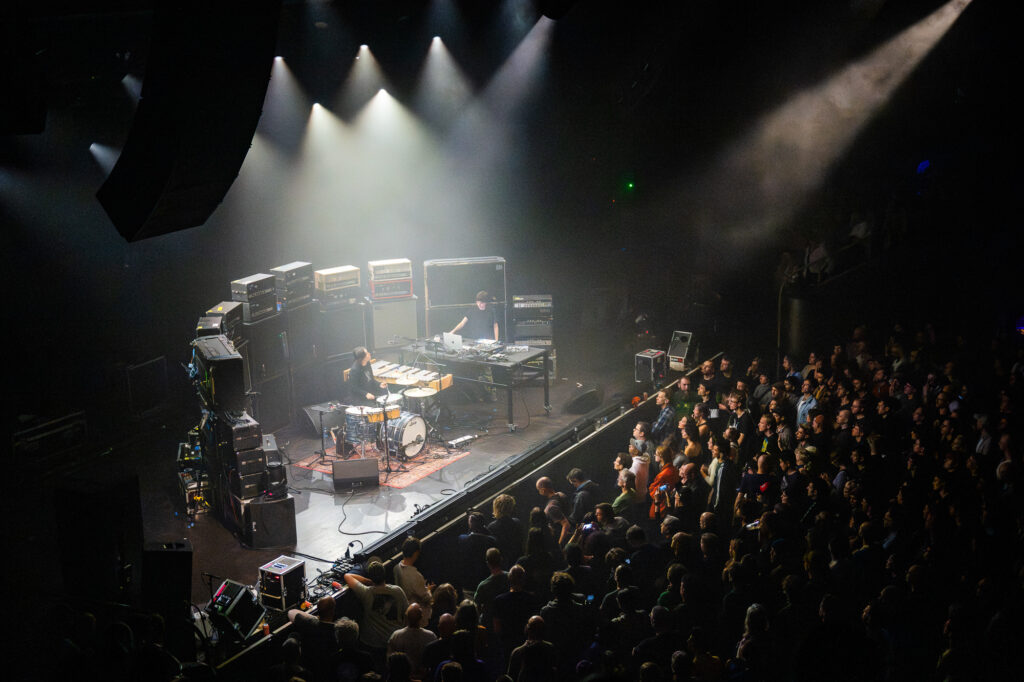
Cosa ci dobbiamo aspettare nei prossimi mesi?
Tantissimo. I Moin hanno appena firmato per 4AD. I Vanishing Twin hanno un contratto di tre dischi con Fire. Sto lavorando al mio album solista: ho già il concept e il titolo, ma non ho avuto un minuto quest’anno. E poi una data in Thailandia. Però la priorità, adesso, è fermarmi due mesi e riprendere fiato.
Oggi ti vedremo in un setup senza batteria, un evento raro.
Sì! È un piccolo lusso che mi concedo. Presentiamo Suono Assente con Zongamin, un disco nato quasi per caso, perché Katy Lucas era incinta e siamo rimasti in studio io e Susumu. Doveva essere per noi, e invece è diventato un successo inaspettato quando AD93 ha deciso di pubblicarlo.
Valentina Magaletti, con la sua presenza diffusa e poliedrica, rappresenta perfettamente lo spirito di Le Guess Who?: il festival come spazio di scoperta, di comunità, di possibilità. Un luogo dove le geografie si intrecciano, i generi si sfumano e l’inclusività smette di essere un tema per diventare pratica concreta.
E dove, grazie a figure come lei, il futuro della musica si può ascoltare da molto vicino.
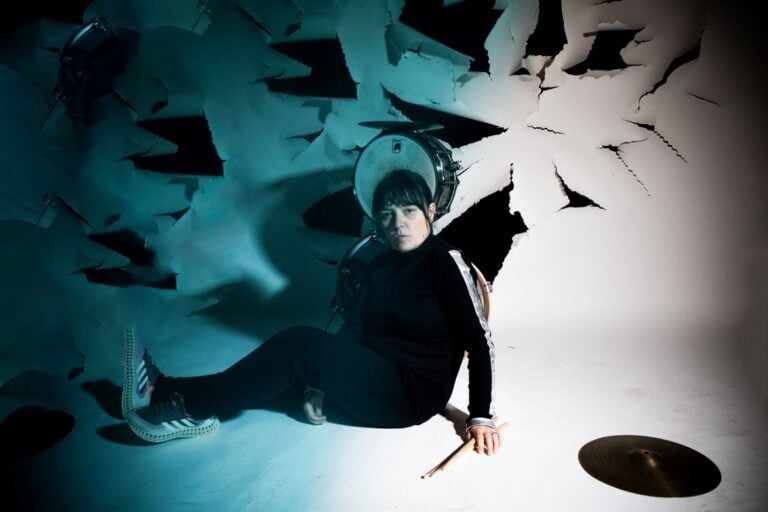
ENGLISH VERSION
Valentina Magaletti, one of the standout artists at this year’s edition of Le Guess Who, sat down with us for a conversation about identity, inclusivity, and much more during the Dutch festival.
Together in sound wasn’t just the slogan of Le Guess Who? 2025 — it was the essence of an edition that turned Utrecht into a global sound map, where musical latitudes intersect without hierarchies or privileged centers. A festival that has long distinguished itself for its curatorial courage and international vision, but that this year pushed the idea of non-Eurocentric programming further than ever, becoming a dizzying journey through free jazz, Indigenous traditions, electronic experimentation, and new diasporic avant-gardes.
Among the key figures of this edition is Valentina Magaletti: Italian-born percussionist based in London, a central force in contemporary avant-rock, tireless experimenter and, this year, one of the festival’s co-curators. Her presence took the shape of a true exploration of her collaborative universe: four different live shows (with UpSammy, Zongamin, Phew, and Moin) and a curatorial selection reflecting a precise musical and political vision.
We met her in Utrecht just a few hours after her first sold-out show, to talk about identity, improvisation, inclusivity, the queer community, museums, future projects, and London — a city she calls the most musical place in the world.
Valentina, welcome to Parkett. Let’s start from here: what does Le Guess Who? represent for you compared to other festivals?
For me, it’s a fundamental festival because it actually does what many others merely claim. Inclusivity, care, non-Eurocentric programming — here they’re not abstract concepts, they translate into real choices: in the lineup, in the production model, in the attention to artistic communities. This year’s edition felt like traveling the world — from Peru to Japan, from cumbia to Indigenous music. It’s what art in general should be, not only music.
Did these principles also shape your curatorial work?
Completely. From the start, Jacob, the artistic director, and I agreed that my selection would be non-Eurocentric. I think around 85% of the artists I invited this year are women, queer, trans, or non-binary. It was natural for me: it’s not a programmatic gesture, it’s simply the reality of the contemporary scene I inhabit and consider vital.
Last night you debuted with the first performance. How did it go?
Really well. It was early, and the space was completely full — two thousand people. The set with upsammy plays with tension and release, it flirts with discomfort, it’s not pop and it’s not what you’d call ‘easy’ electronics: it’s a very niche project. And yet the energetic dialogue was intense. It really struck me.
Was the live set based on the tracks from the upcoming record?
Yes, we played material that will be released on Pan in March.
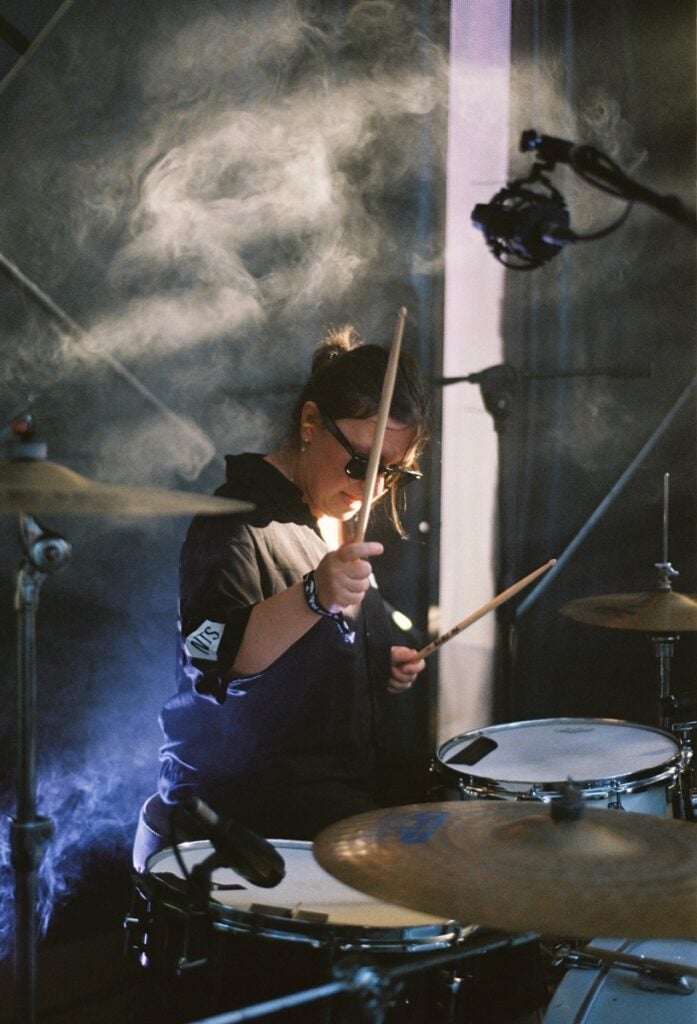
Your project with UpSammy was born in a museum context, right?
Yes, we first met through a commission from the Rijksmuseum. We spent days studying the acoustics of the museum rooms, recording with incredible microphones, bringing marimbas and percussion everywhere. Out of that residency came the natural desire to make a record. Then my booking agent suggested taking it from the museum into live settings — and here we are.
You also have a strong connection to visual work — I’m thinking of Batterie Fragili.
Absolutely. My work with Yves Chaudet is a study on fragility, friction, materials. For me it’s not a side project: it’s integral to my artistic path. I spend more time choosing a cover than a mastering engineer. But I haven’t yet found my visual-artist soul mate — I’m not looking for spectacular visuals, I want someone who adds meaning.
Tonight you’ll play with Zongamin, on Sunday with Moin, and then there’s the performance with Phew — one of the most radical figures of the Japanese scene.
Phew is a national treasure to me. When they told me I had carte blanche for invitations, I immediately tried with DJ Sprinkles and Phew. And we managed to bring her from Tokyo — it feels like a dream.
Will your set with her be fully improvised?
Yes. We wrote each other by email and agreed on one thing: we’ll listen to each other. Everything depends on who ‘speaks’ first. Improvisation, for me, works like a conversation — if there’s trust, dialogue, and mutual understanding, it can’t go wrong. Jazz and punk, in the end, are the same thing to me.
I’m a huge jazz fan — last night I regained faith in humanity.
Have you had the chance to see other performances at the festival?
Yes, and Ahmed’s concert was incredible. I never film shows, but last night I couldn’t help it. These are the moments that restore your faith in humanity, and in the very meaning of making music.
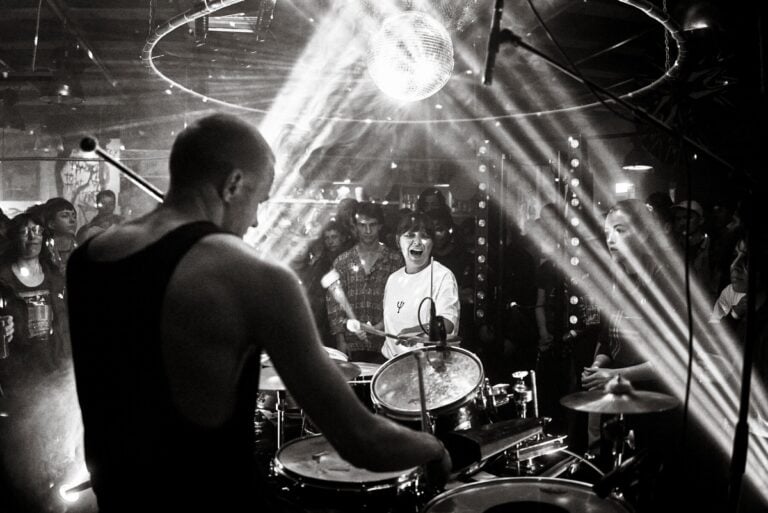
You’ve been living in London for 25 years. What is your relationship with the city today?
London is still the city where you don’t need to travel to travel — everything comes to you. I live next to Café Oto, which is basically my second living room; my best friend recently became its artistic director. And the UK has always had a special relationship with music: from Two Step to Garage to Drill. You can’t beat it.
People often describe you as “tireless,” constantly moving, always involved in new projects.
More than tireless, I always say I need to change. I can’t imagine making a record and touring it for three years — it would feel like an office job. I need to be stimulated; I need not to know how things will end.
What should we expect from you in the coming months?
A lot. Moin have just signed with 4AD. Vanishing Twin now have a three-album deal with Fire. I’m working on my solo record — I already have the concept and the title, but I haven’t had a minute this year. And then there’s a show in Thailand. But honestly, my priority now is to take two months off and breathe.
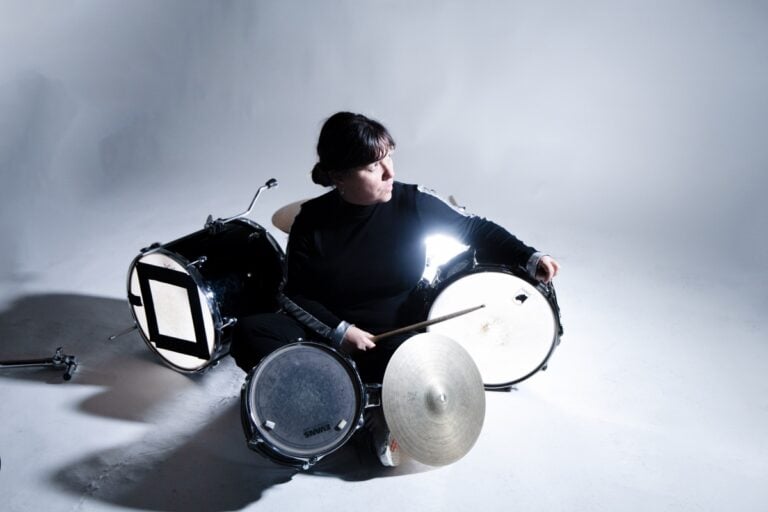
Today we’ll see you in a setup without drums — a rare event.
Yes! It’s a small luxury I’m allowing myself. We’re presenting Suono Assente with Zongamin, a record that was born almost by accident, because Katy Lucas was pregnant and it ended up being just me and Susumu in the studio. It was meant to be for us, and instead it turned into an unexpected success when AD93 decided to release it.

